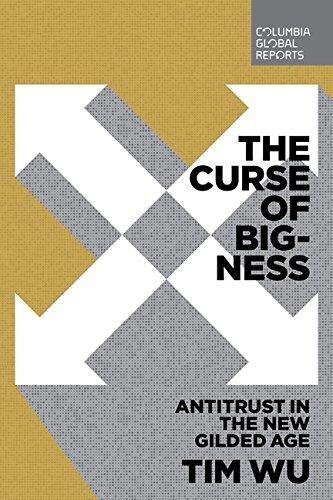Columbia Law School professor Tim Wu offers a concise history of US antitrust actions and calls for renewed efforts against today’s monopolies.

Bust the Trusts!
In this Washington Post bestseller, policy advocate, Columbia Law School professor and New York Times opinion writer Tim Wu – creator of the phrase “net neutrality” – offers a concise, focused and surprisingly engaging history of US antitrust monitoring and of the powerful personalities involved. In weaving a colorful and dramatic tale, Wu makes a convincing argument that this neglected area of economic law fundamentally shapes the American economy. In an era of income inequality, high market concentration and technology giants, readers will find this a timely analysis.
Rana Foroohar wrote in The Financial Times that in this “sharp analysis of antitrust law…[Wu] makes an impassioned case for a return to an earlier interpretation of antitrust law, one focused on power.” Benjamin C. Waterhouse of The Washington Post called this a “brisk and impressively readable overview of the subject, vivid and compelling.”
Alec Stapp of the Niskanen Center offers an opposing view by arguing that Wu’s approach suffers from “the inability to distinguish between natural and government-granted monopoly.” Stapp maintains that large companies pay more, offer better benefits, create more net jobs and employ a more diverse workforce than small companies do. He frequently cites Robert Bork’s The Antitrust Paradox; readers seeking a balanced perspective might want to read both Wu’s and Bork’s texts.
Trusts
Wu notes that, by the end of the 19th century in America, large entities had destroyed or bought out their competitors: In 1895, estimates showed 2,274 manufacturing companies in operation, but by 1904, just 157 remained. John D. Rockefeller controlled 90% of America’s oil industry for 30 years.
Rockefeller liked to offer his smaller rivals the choice first popularized by Genghis Khan: Join the empire, or face complete destruction. Tim Wu
Wu regards JP Morgan as history’s greatest monopolizer, a banker central to many of the deals that created massive business trusts. Wu recounts that, when Morgan bought out Andrew Carnegie to put together US Steel, Carnegie became the richest man in the world. At that time, popular support grew for an Anti-Monopoly Party and for the populist three-time Democratic presidential nominee William Jennings Bryan. Congress responded with the Sherman Antitrust Act of 1890. But, Wu explains, the political will to enforce it was weak, and its deliberately imprecise language undermined its effectiveness.
Brandeis, Roosevelt, Taft and Wilson
Wu’s hero in this tale is Boston lawyer and Supreme Court justice Louis Brandeis. Brandeis believed in the merits of small, human-scale economic structures to decentralize power and to create environments in which individuals could develop their full potential. Through his popular writings and legal opinions, Brandeis became a significant progressive influence on presidents Theodore Roosevelt and Woodrow Wilson.
What Brandeis noticed is something we often ignore. We like to speak of freedoms in the abstract, but for most people, a sense of autonomy is more influenced by private forces and economic structure than by government.Tim Wu
Wu shows why Roosevelt, in his belief that the US Constitution upheld the limiting and separation of powers, felt that massive trusts overwhelmed the will of the people. Roosevelt confronted America’s most powerful interests, and a 1911 Supreme Court ruling enabled the breakup of Standard Oil. Wu tallies Roosevelt as pursuing 45 antitrust cases and President William Taft, 75, including those against US Steel. Brandeis also influenced President Wilson’s popular “regulated competition” platform. The author regards the 1914 Clayton Act as toughening the Sherman Act and leading to the Federal Trade Commission.
He [Theodore Roosevelt] added that the trusts are creatures of the State, and ‘the State not only has the right to control them, but it is in duty bound to control them wherever need of such control is shown.’ And so here begins the trust-busting tradition in its hour of greatest glory. Tim Wu
Antitrust policy remained an uncontroversial part of the US system. In 1950, Congress passed an Anti-Merger Act to control and undo mergers. Wu finds the final trustbusting of this antimonopoly era to be the case against Microsoft. Wu makes clear that without this action, neither Google nor any of the tech companies that followed could have prevailed against Microsoft’s monopoly.
Limits
Wu highlights a group from the Chicago school of economics, spearheaded by attorney Robert Bork, that questioned the prevailing antitrust wisdom. Wu summarizes their beliefs as: If a company grows large, it must be giving customers what they want. The group believed antitrust measures should first prove tangible harm to consumer welfare.
These concepts gained support from right-wing economists, and Wu finds the tipping point occurred after the Microsoft settlement, when the George W. Bush administration stopped taking on antitrust cases.
It is a disservice to the laws and their intent to retain such laserlike focus on price effects as the measure of all that antitrust was meant to do.Tim Wu
Wu reveals that, today, the number of companies on stock exchanges has fallen by 50%; that three large cable companies predominate, while consumer bills grow by 8% per year; and that two companies control 70% of US beer sales.
Advocating antitrust revival is not meant to compete with other economic proposals to address inequality. But laws that would redistribute wealth are themselves blocked by the enhanced political power of concentrated industries.Tim Wu
The author describes how, as industries concentrate, lobbying gains greater scope, and companies campaign to become bigger and more monopolistic. The author finds positive outcomes when companies split up. He relates how big firms today choose spin-offs or dissolution to improve incentives or efficiency.
Improve Competition
Wu asks whether a justifiable, practical reason exists for Facebook owning Instagram and WhatsApp, or for Google controlling YouTube.
A teenager could have told you that Facebook and Instagram were competitors…With this level of insight, the world’s governments in the 2010s did nothing to stop the largest firms from buying everyone and anyone who might be a potential threat.Tim Wu
Wu calls for a revival of the wider remit of antitrust. He demands more open and democratized merger investigations, claiming that the United States must regain its mantle as the original trustbuster nation.
Authority and Readability
Tim Wu writes with great authority and surprising readability about what you might think is a for-wonks-only topic. Wu entwines his staunch economic philosophy into an overview of US history and how monopolies have waxed and waned over time. In what seems to be more of a college textbook than an argument intended to change anyone’s already-fixed position, Wu lays out the issues clearly. The author’s position is ideological, of course, but most readers will find his book a necessary and welcome addition to any reasoned discussion of economic policy.
Tim Wu is the author of The Attention Merchants and The Master Switch, and the co-author of Who Controls the Internet?. Related readings include Denise Hearn’s and Jonathan Tepper’s The Myth of Capitalism, and Amy Klobuchar’s Antitrust.










